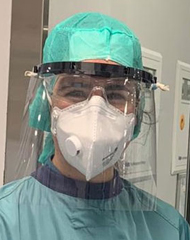"Being at home gave me a certain feeling of helplessness as I saw that status at attendance was getting very complicated and that there was a lack of resources".
Begoña Errasti, professor at School Nursing, joined the CUN Madrid ICU during the peak of the pandemic.

PHOTO: Courtesy
When the University of Navarra's class activity was suspended due to the COVID-19 pandemic, Begoña Errasti moved her teaching to the digital environment. From her home, she continued to teach her Physiopathology classes to 1st year Nursing students.
During that time of confinement, after the declaration of the state of alarm, an idea was in her head. "As I watched events unfold, I became more and more aware of the real possibility that those of us nurses who were not working would be called from attendance ," she recalls. When the call finally came, Begoña was relieved and happy to be able to help a little. "Being at home, although I was fulfilling my teaching obligations, gave me a certain feeling of helplessness as I could see that status at attendance was getting very complicated and that there was a lack of resources of all kinds subject, including human resources," she says.
He did not hesitate and on April 4, he joined the Intensive Care Unit (ICU) of the Clínica Universidad de Navarra in Madrid.
"Since I hadn't worked as an ICU nurse for 8 and a half years, the week before I joined internship I went to the clinic in Pamplona to retrain," she says. Begoña taught classes in the morning and went to the ICU in the afternoon at schedule . "At the weekend I was also going to the Clinic, as I felt I needed to go as much time as possible to be able to remember the different protocols, the care of critically ill patients, the respiratory modalities of mechanical ventilation, drug administration, learning some new technologies.... I needed to make the most of the time I had for this training in order to go to Madrid with greater safety and in the best possible conditions," he says.
In Madrid, Begoña has been dedicated to the care of critically ill patients. Like the rest of the nurses, assistants and orderlies, she has worked 12-hour shifts, day or night. "When I arrived I found a great team of professionals who, under conditions that were far from easy, have made an incredible effort and work to take care of all the patients they could," she acknowledges. "The atmosphere has always been one of gratitude, joy, companionship and financial aid", he emphasizes.
For Begoña, the most painful thing has been to think that each patient was a unique person, with a life story, a family, circumstances... and the repercussions that her status and evolution could have on her life and that of her loved ones. But she is also clear about what has been the most satisfying thing: "Being able to work as an intensive care nurse again and, therefore, being able to take care of people".
Begoña has been working at the Clinic in Madrid until April 17. It has been a really positive experience and I am very grateful for having been able to spend these days there. I have met exceptional professionals and patients who have taught me a lot," she concludes.





